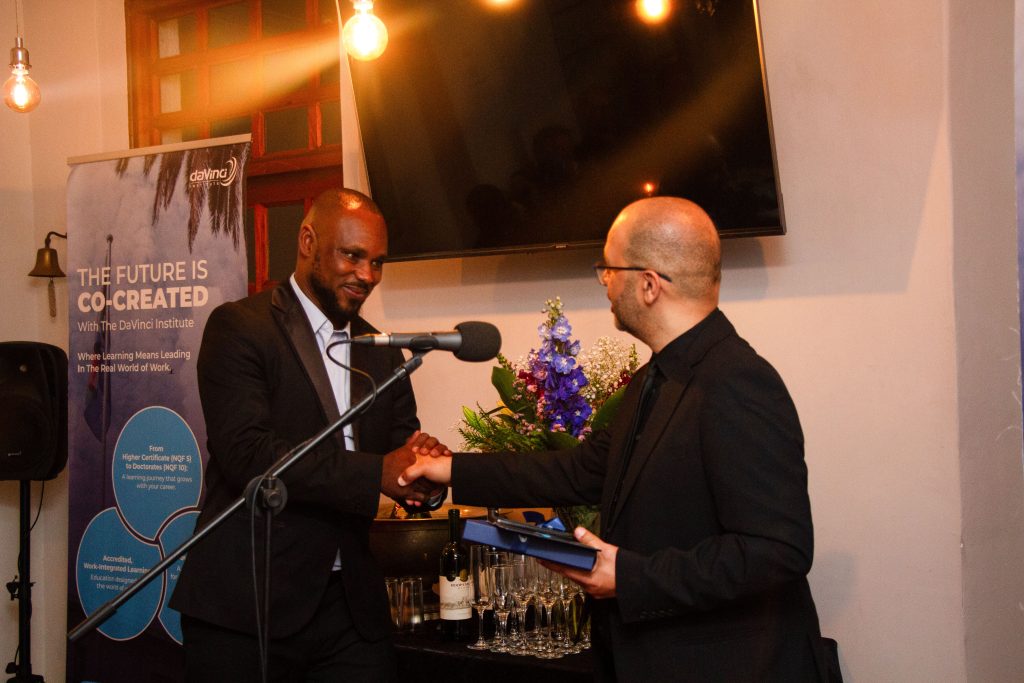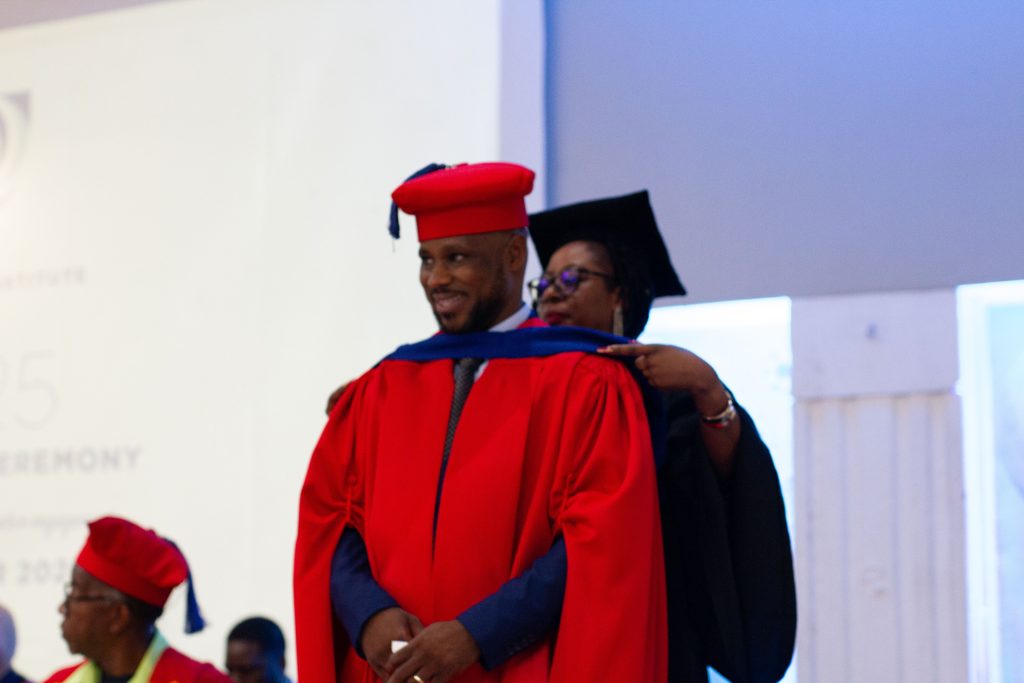Dr Gabapelo Emmanuel Phillip, could you please give us a brief overview of your career to date?
I am an industry expert with two decades of experience spanning higher education, corporate sector and business consultancy. My professional purpose lies in bridging the gap between academia and industry, to transform insight into impact through strategy, innovation and knowledge-driven decision making. I led various projects across the telecommunications, higher education, and consulting sectors, implementing data-driven solutions that enabled business growth and digital transformation. Currently, I am a lecturer at Botswana’s leading School of Business. I deliver innovation and graduate employability-aligned programmes informed by market and national development priorities, focusing on curriculum renewal to create learning experience that is both relevant and transformative. I am a Lecturer for modules that include Implementing Strategy & Change, Creative Problem Solving, Entrepreneurship and Business Development.

In industry, I held a managerial role as Head of Marketing and Business Development, and spearheaded the setting up of the Marketing, Admissions and Corporate Training departments at the newly established Botho University campus in Maseru Campus with the primary focus in integrating technology, people, and systems. Managed commercial strategy implementation. B2C & B2B marketing: Business development across the university’s B2C and B2B portfolios and customer experience design with the goal of building partnerships and expanding reach within the country.
Previously, I served as Marketing and Communications Specialist at Mascom Wireless, leading the execution of 3rd-party campaigns, project management and market intelligence initiatives. Crafted short-term commercial strategies rooted in deep market insights and consumer behaviour analysis, delivered a 5-year Compound Annual Growth Revenue double digit growth with extensive use of marketing and operational excellence initiatives.
In a few words, how can you describe your journey to completing your qualification?
This journey was quite intensive and grueling. As a many-years research journey, it means the originality of the study was a key attribute and involved the invention of a problem to tackle, one that was partly solved or was never solved. In the context of my study, the problem related to a set of related KM challenges among the selected Mobile Network Operators in Botswana’s Telecommunications Sector. I credit The DaVinci Institute for much of the success thanks to the genuine care and mentorship from my supervisors, who introduced me to the richness of various theories and the rigorous methodologies that grounded my study and shaped the way I think. This demonstration of critical and creative skills has occurred – a deep knowledge of the knowledge management field, advanced methods of inquiry, and the ability to synthesize different sets of developments within the field.
What was your most significant challenge that you faced during your doctorate journey at The DaVinci Institute, and how did you overcome that?

The passing of my academic supervisor, Professor Joel Chigada, was quite painful. He passed on in February 2025, a few days before receiving feedback from external examinations. I remain so indebted to that man!
The DaVinci Institute has as part of its learner support system, assigned psychologists to every doctoral candidate for a quarterly ‘meet and chat’ and this helped a great deal. These interactions indeed provided what one could call the ‘DaVinci experience’ and here we are. I finally got my capping!
Can you share a moment or an experience during your doctoral studies that had a profound impact on your thinking or approach to your research?
I was invited to participate as a doctoral student presenter in one of the monthly colloquial sessions held at The DaVinci House. With many of the subject matter experts attending these colloquial sessions, they become a hub for forward-looking scholarly discussions and opportunity for eye opening conversations. Coming out of the colloquial session, I thought it strengthened my analytical and research capabilities that enabled this study to succeed, leading to the successful development of a tailored KM framework, conceptualised to be the solution for driving sustainable development and transformation of the selected MNOs in Botswana and the telecommunications sector at large, both locally and globally. As they say, colloquia is usually a space where research meets practice
Can you describe how you incorporated the DaVinci Institute’s TIPS™ Framework in your study, and the value it added to your research?
The DaVinci Institute’s TIPS™ Framework plays a significant role from a technology, innovation, people and systems perspective because organisations need to survive, grow and innovate. MNOs need to embrace the new change. The development of the conceptual KM framework for the selected MNOs in this study was founded on the interlocking tenets of interconnectedness and interrelationships across the functional areas of organisations. It looked beyond individual organisations’ boundaries to ensure the multiple stakeholders understand the bigger picture and consequently, to appreciate the other components of a system (the organisation) being interlinked.
The TIPS™ Business Framework espouses for the high-level co-creation of knowledge and collaboration, recognition of synergistic accomplishments and workplace integration that views the organisation as a system, determining patterns that may help an organisation to develop effective operational methods. With TIPS™ Business Framework emphasises for alignment of organisational processes and thus, the development of the KM framework, conceptualised in the context of 4IR, through embracing of the TIPS™ business framework, Botswana’s MNOs, and even the telecommunications sector regionally and globally, will be able to enhance their current processes, be it processes, financial models and even from a profitability perspective.
Dr Gabapelo Emmanuel Phillip, What impact would your research have on your organisation, your community or society at large?
A significant contribution for development of the conceptual framework to these MNOs is the promise for enhanced knowledge access to individuals. In essence, the knowledge acquired will serve as a compass to steer MNOs towards sound financial strategies due to reduced wastages, enhanced performance levels, the efficiency of telecommunications networks, providing invaluable insights into areas of resource allocation, risk assessment and strategic planning.
Further, without knowledge, society may not be aware of the many opportunities that the economy has to offer and, therefore, may be excluded from effectively participating in the knowledge economy. Equitable knowledge access, from the success of the conceptual KM framework will enable citizens to have facilitated access to the various services provided by the government using multiple telecommunication platforms. With the telecommunications sector considered the backbone of connectivity and driver for 4IR, these cutting-edge innovations and advanced technologies will significantly empower the industry and society, enhancing user experiences, improving reliability, and revolutionising the way people communicate.
What advice would you give to incoming doctoral students at The DaVinci Institute, considering your own experience and the insights that you have gained along your journey?
Embarking on a doctoral journey is a monumental task that requires dedication and a support system to guide you through the numerous challenges. To complete a doctorate can be daunting and a successful completion of the doctoral journey should be a recognised rite of passage to acknowledge one’s entrance into the community of scholars within their discipline. Inevitably, it matches the magnitude of the challenge that one would have met through their journey of study. This, therefore, underscores the importance of having an appropriate support system and ‘cheerleaders’ to keep you motivated, encouraging you to consistently show up at your best.




Leave a Reply